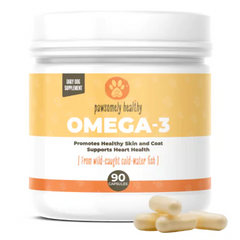Just like humans, dogs can suffer from allergies and all of the miserable side effects.In fact, they may have a tougher time because they spend so much time outdoors and are in even closer contact with trees, flowers, and pollen.
Thankfully, there are safe solutions to help your dog!
What Causes Allergies in Dogs?
An allergy occurs when the body’s immune system overreacts or is hypersensitive to a substance, otherwise known as an allergen.
Typically, an immune response is a good thing, as it protects your dog’s health. But with allergies, the immune response can be harmful and cause a lot of discomfort.

What types of allergens affect dogs? Many different substances can be allergens for your dog. Pollen from trees, flowers, and grasses can trigger seasonal allergies in pets just as they do in humans.
Since different plant life blooms at different rates, the easiest way to determine what allergens are affecting your pup is by visiting Pollen.com. This website will let you know what’s blooming in your area at any given time. Did you know that some dogs can even be allergic to their dog food? Similar to people, some pets have allergic reactions to certain foods. Food allergies can develop at any age. Often, the main culprit is the food’s protein source: beef, lamb, chicken, eggs, dairy, or soy. Knowing the ingredients of your dog’s food can help you avoid potential reactions.

Other potential allergens include mold spores, dust mites, and even shed skin cells!
And, yet, some dogs are completely unaffected and don’t have allergies at all. So how can you determine if your dog suffers from seasonal allergies?
Signs Your Dog Has Allergies
Signs of an allergic reaction vary from dog to dog. But in general, the following symptoms can indicate that your dog has allergies:- Itchy paws. This is usually caused by walking in grasses or weeds that they're allergic to.
- Runny eyes, aka tear stains, often stemming from common allergens in food, such as beef, chicken, dairy, or other proteins.
- Bald patches from scratching too much
- Itchy ears. This often shows itself as shaking their head or scratching their ears vigorously.
- Sneezing
- Nausea or vomiting
- Swelling or hives
- Fatigue

For people who have allergies, it's not uncommon to hear individuals dismiss the symptoms with the phrase, “Oh, it’s just allergies."
But with our dogs, it's not so simple.
If left untreated, these symptoms can get worse over time and even cause other health problems with your dog’s skin, ears, and respiratory system. Promptly treating your fur family’s allergies not only gives them relief but also supports their overall health and well-being.
Supplements for Dogs with Allergies
The best way to help your dog’s allergies is to use a natural solution that supports their immune health. Supplements that are natural and whole (not synthesized in a lab) are the best solutions for providing relief from allergies.
Here are four of the best supplements for allergy relief:
Omega-3 Fish Oil
Omega-3 fatty acids are “good fats” that your dog can't produce on their own and must get from their diet or a supplement. This powerful ingredient helps to prevent and regulate inflammation-related conditions such as seasonal allergies.
A word of caution: not all omega-3 supplements on the market are beneficial for your pup. Be sure to choose a quality supplement to maximize its benefits.
For example, Pawsomely Healthy’s Omega-3 is sourced from wild-caught anchovies that are free from toxins and heavy metals. Since small fish, like anchovies, are at the bottom of the food chain, they have short life spans. This means they don’t accumulate toxins and heavy metals the way larger fish, such as salmon, can over their longer life span. And unlike other options on the market, this omega-3 is freeze-dried in capsules so it lasts longer than if it were served as an oil. You can give your dog the whole capsule or sprinkle the powdered omega-3 over their food.
Some dog foods claim to add omega-3 to their product, but the kibble is usually heat treated at very high temperatures, which can neutralize all the good benefits of this powerful ingredient. This omega-3 supplement, however, is manufactured differently, ensuring your pup gets all the nutrients.

Green Lipped Mussel
This unique ingredient is only native to and harvested in New Zealand. It has tremendous anti-inflammatory properties and is rich in omega-3 fatty acids and a host of other beneficial compounds. As a result, it plays a crucial role in managing inflammation related to allergies. Since green lipped mussels are a natural food source, it’s easy for your dog to absorb, allowing them to get the full benefit.
Vitamin C
Vitamin C is widely used by humans for its antioxidant and immune-boosting powers. Although dogs can produce this nutrient on their own, when their bodies are under stress, they could use an extra boost. If your dog has allergies, vitamin C acts as a natural antihistamine that can fight inflammation and calm their symptoms. In fact, when taken regularly, vitamin C can even help prevent future allergic reactions.
A word of caution here: don't give human-grade vitamin C supplements to your dog. These supplements are ascorbic acid and not the proper dosage for your pup.
Pin me!

When to See Your Vet about Your Dog's Allergies
Most seasonal allergies can be managed at home. But if your dog has a serious or severe reaction, you should consult a vet.
For example, if your pup is vomiting, their skin is raw and infected, they are having trouble breathing, or they are generally in distress, go to your veterinarian right away.Your dog’s doctor can perform a thorough physical examination, identify the cause of the allergy, rule out any underlying medical issues, and recommend treatments as necessary.

FAQs
Is Zyrtec or Benadryl safe for dogs?
Yes, with your vet’s permission. These over-the-counter medicines can often safely be given to dogs to treat seasonal allergies. However, these medications sometimes have undesirable side effects like excess drowsiness. Also, they don’t support your dog’s long-term immune health. In the end, a natural supplement will deliver better results.
What is the most common allergen for dogs?
Each dog is different, but generally, the top 3 allergens can be broken down into three groups:
1) Environmental - think grass, pollen, and mold.
2) Food allergies
3) And surprisingly, flea bites! The proteins left behind from a flea’s saliva can trigger an allergic reaction.

